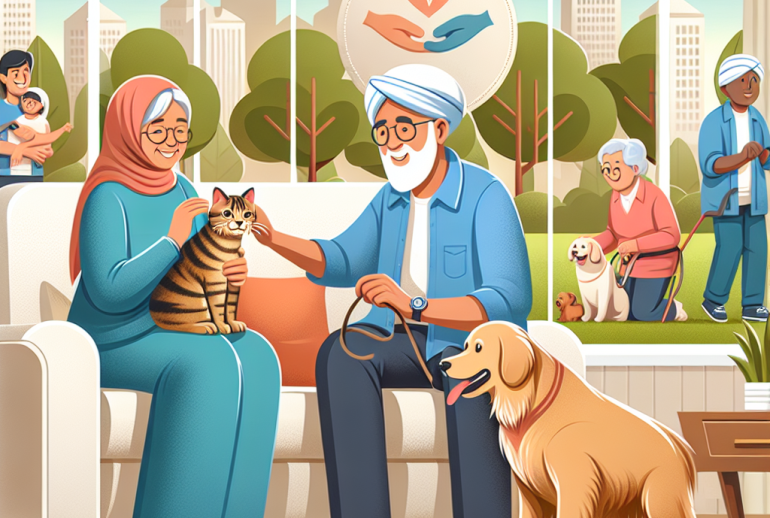In the twilight years of life, social interactions and physical health can often take a backseat for many seniors. As children move out, spouses pass away, and friends become fewer, the looming threat of loneliness and deteriorating health becomes more palpable. Luckily, a solution to these challenges could be something as simple and heartwarming as pet ownership. This post delves into the myriad benefits of pet ownership for seniors, exploring how our furry, feathered, and even finned friends make a tremendous positive impact on the lives of the elderly.
Companionship and Reduction of Loneliness
One of the most profound benefits of having a pet is the companionship they provide. Loneliness can lead to depression, which affects both mental and physical health. Pets offer a consistent source of love and affection. Dogs greet their owners with enthusiasm, while cats may gently nudge senior citizens, showing unspoken yet profound love. This companionship helps seniors feel needed and less isolated, providing a sense of purpose and responsibility.
Promoting Physical Health
Physical activity is a cornerstone of good health, and for many seniors, it becomes increasingly difficult to stay active. Pet ownership, particularly with dogs, necessitates regular activity. Daily walks, playtime, and even routine care tasks such as feeding and grooming help to keep seniors moving. Physical activity doesn’t just benefit the body; it also releases endorphins, which improve mood. Some studies have even shown that pet owners have lower blood pressure, reduced cholesterol levels, and a lower risk of heart disease.
Improved Mental Health
The mental health benefits of having a pet are substantial. The simple act of petting an animal can release oxytocin, a hormone that reduces stress and fosters feelings of comfort and bonding. For seniors, who may be dealing with anxiety or depression, this can be extraordinarily beneficial. Moreover, the routine of caring for a pet can introduce a highly beneficial structure to daily life. Knowing that they have to get out of bed to feed the cat or walk the dog can be a great motivator for seniors who might otherwise lack the impetus to engage with their day.
Social Interaction
Pets serve as natural icebreakers and conduits for social interaction. Dog parks, veterinarian visits, and even casual encounters on daily walks can result in conversations and friendships that might not otherwise happen. This increased level of social interaction can help alleviate feelings of isolation and contribute to a more vibrant, socially engaged lifestyle. Pet owners often form communities where they share tips and stories, adding another layer of social support.
Sense of Security
Pets can offer a sense of security, especially dogs that are trained or naturally inclined to protect their owner. The presence of a dog can deter burglars and provide an early warning system for possible dangers. Even for those without fears of crime, the mere presence of an alert and attentive animal can offer peace of mind, making seniors feel safer in their homes.
Therapeutic Benefits
Many seniors suffer from conditions such as arthritis, Alzheimer’s, or other chronic illnesses. The therapeutic benefits of pet ownership can be particularly pronounced for these individuals. Animal-assisted therapy has been shown to improve cognitive functioning in seniors suffering from Alzheimer’s. Furthermore, caring for pets offers a distraction from chronic pain and an opportunity to focus on something outside their own discomfort. The act of caring for a pet can be simple yet profoundly therapeutic, offering tactile stimulation and a sense of achievement.
Boost to Self-Esteem
Taking care of an animal, ensuring that it is fed, walked, and groomed, provides a sense of accomplishment. For seniors, this role reversal—from being cared for to being a caregiver—can significantly boost self-esteem and pride. It reinforces the feeling that they can still make a meaningful contribution to another living being’s life.
Memory and Cognitive Function
Interacting with pets can also stimulate cognitive function and memory. Engaging with an animal involves remembering feeding times, healthcare routines, and behavioral cues, which can serve as gentle cognitive exercises. Seniors with pets often experience delayed symptoms of cognitive decline, thanks to the multi-faceted interactions involved in pet care.
Emotional Support and Stability
Emotional well-being is critical at any age but can be particularly fragile in senior years. Pets offer unconditional love and support, providing emotional stability during trying times. The presence of a pet can offer solace and comfort, helping seniors navigate the emotional ups and downs of aging, loss, and other life challenges.
Caring Considerations: Choosing the Right Pet
While the benefits of pet ownership are abundant, it’s crucial to consider the senior’s lifestyle and capabilities when choosing a pet. Low-maintenance pets like fish or birds might be suitable for those with mobility issues. Cats require less physical activity compared to dogs but offer the same emotional and mental health benefits. For more active seniors, a dog might be the best choice, providing both companionship and a reason to stay active.
Adopting older pets from shelters can be another excellent option. Older animals are often calmer, trained, and less demanding than younger ones. Many shelters even have programs that pair senior pets with senior humans, ensuring a good match.
Conclusion
The companionship, emotional support, and physical benefits that pets provide can significantly enhance the quality of life for seniors. From reducing loneliness and enhancing physical health to offering emotional stability and boosting self-esteem, the positive impacts are evident. When thoughtfully chosen and responsibly cared for, pets prove not just to be companions but veritable lifelines for senior citizens, enriching their golden years with joy, purpose, and unwavering affection.

